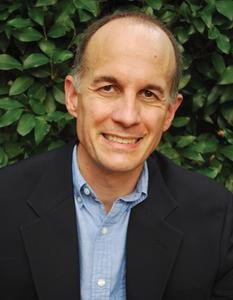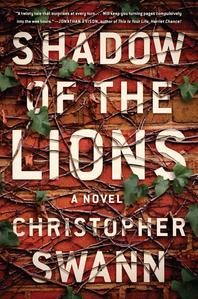
|
|
| photo: Kathy Ferrell Swann | |
Christopher Swann chairs the English Department at Holy Innocents' Episcopal School in Atlanta, Ga., and attended a prep school while growing up. Both experiences influenced his debut novel, Shadow of the Lions (reviewed below), a mystery set in a fictional all-male boarding school called Blackburne. Matthias Glass is a student there. During senior year, he gets into an argument with his best friend, Fritz, who then disappears without a trace. Ten years later, Matthias returns to the school as an English teacher and vows to find out what happened to Fritz.
You attended a boarding school, and now you're the chair of an English department at a private high school. How did these experiences influence your novel?
I attended Woodberry Forest School in Virginia, which was a profoundly formative experience. Basically I took some of the best parts of Woodberry and incorporated them into Blackburne, the fictional school in my novel. As for the less-than-good parts of Blackburne, I pretty much invented them. There are a lot of Easter eggs in the book for anyone who went to Woodberry, especially members of my graduating class.
As a department chair, I've had the privilege of witnessing outstanding teachers, and I've also seen teachers make mistakes. I certainly have. In my novel, Matthias Glass, the protagonist, is essentially a novice teacher returning to his alma mater to teach in an effort to pull himself together, and I worked hard to remember what it was like to be a new teacher. You walk into a classroom and are faced with all these teenagers. You're in the spotlight. I thought it would be a good place to put Matthias, dramatically speaking.
As someone who works with high school students every day, please tell us: To what degree do the events of high school continue to affect our grownup selves? Do we ever really leave high school behind?
Everything that happens to us as teenagers is so freighted with meaning and importance. First love, first heartbreak, first failure, first success--they all feel invented just for us, as if each of us is the first person to experience them. We know that's not true, but they feel that way. And even as we get older and perhaps wiser, and we gain a little more perspective on those events, they still have a hold on us. They may not ultimately define us, but they definitely shape us to some degree.
I was a total geek when I arrived at Woodberry, and I felt it was painfully obvious to everyone, and I was afraid I would have no friends and would feel terribly lonely. But I was curious-minded and liked learning, so I did well in school. And I made friends. But I remember that shy, dorky, 14-year-old kid that I used to be, and as someone who works with teenagers, I always try to treat them the way I wanted to be treated, and usually was, when I was their age.  Your plot is engaging throughout, but I was struck mostly by the moments of unspoken understanding between characters. Which is more important when writing a mystery--plot or character?
Your plot is engaging throughout, but I was struck mostly by the moments of unspoken understanding between characters. Which is more important when writing a mystery--plot or character?
Most of the mysteries I like are enjoyable not just--or even primarily--because of their plots; they are enjoyable because of the characters and the writing. I've always liked stories that weren't tightly bound in the confines of genre--Chaucer's Canterbury Tales being an early example, or Shakespeare's plays, which operate in recognizable genres but also often subvert them. A more contemporary example would be someone like Martin Cruz Smith, whose Arkady Renko novels have a special shelf in my library at home. He is an excellent writer--the New York Times called him one of our best writers, period--who happens to write stories that involve mysteries. I deliberately set out to write a book like that, something that is well written and has authentic characters and also has an interesting plot. I realized that while there are only so many plots in the world, there are billions of unique human beings, and so I focused on the characters most of the time.
In the interest of full disclosure, I must also confess that I have a wonderful wife who reads my work and gives me very honest and valuable feedback. The fact that she is a psychologist may be relevant!
Your book is clearly fiction, but it includes critiques of such general problems as police corruption and the ability of powerful people to warp the lives of others to meet their own needs. What do you hope readers take away from these critiques?
Those issues were convenient for the story I was trying to tell, and I'm certainly no expert in them. But power can corrupt, and the more power a person has, the more potential exists that this powerful person can misuse it. If you look hard enough, dig down deep enough through the more superficial layers we put on every day, you find out that everyone is human, everyone is experiencing some sort of a struggle. No one has a premium on suffering. Matthias is pretty self-centered and flawed, which I find interesting, both psychologically and dramatically. But he knows he is self-centered, and he doesn't like it. He generally wants to be a good guy, to do the right thing, but he isn't always sure how to do it.
People tend to be healthier and happier when they have genuine relationships with other people, relationships that they cultivate and nurture. When you don't have that, when you twist or abuse relationships as a means to an end, that's a kind of corruption, a warping, a fallen state of being, not to get too metaphysical. We are all capable of doing that, of failing, of making bad decisions. But it's what we do next that becomes important. I wanted to see how Matthias would react when given a second chance, so to speak, especially in the face of some pretty daunting problems.
What's next for you?
I'm going to try to enjoy the ride of this first book tour as long as I can. I'm going to wring every bit of joy I can from the experience. I'll be the guy who checks into a hotel in Raleigh and says, "Oh, wow, they put an iron in my hotel room!" Then the school year will start and I'll be brought crashing down to earth. In the meantime, I'm well into my second novel and thinking about my third. If only summer were a little longer.... --Amy Brady, freelance writer and editor

